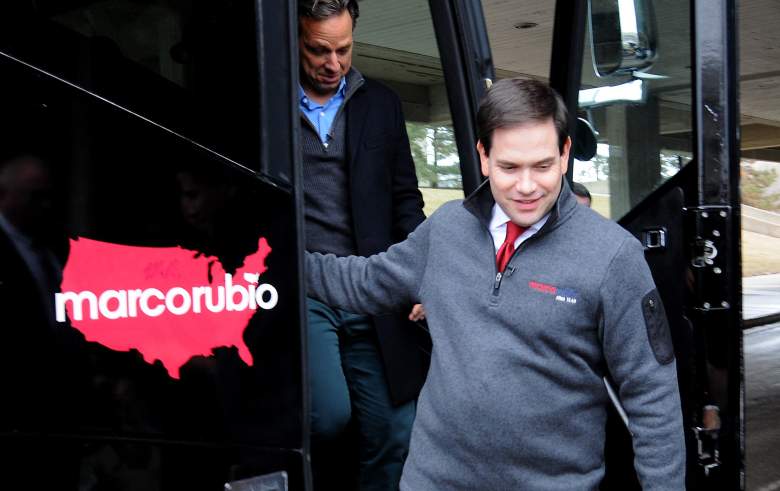
Marco Rubio, shown here arriving for a rally at Iowa State University on January 30, is hoping to ride late momentum to a strong finish in Monday’s caucus. (Getty)
After months of campaigning, debating and wall-to-wall media coverage of Donald Trump, voters in Iowa are finally set to caucus on Monday.
The caucuses will provide answers to some key questions and set the tone for how the campaign shakes out. That’s true on the Democratic side, where Hillary Clinton is hoping to avoid an embarrassing loss to Bernie Sanders. But it’s even more true on the Republican side, where we’ll get our first answer to a handful of key questions: Can Trump turn his polling advantage into actual votes? Can Ted Cruz put a win on the board in a state he desperately needs?
And, maybe of greatest importance to GOP voters hoping to stop Trump but not willing to hop on board the Cruz bandwagon: Can Marco Rubio perform well enough to re-emerge as the favorite to win the nomination?
Let’s delve into that one a bit further.
The Conventional Wisdom Has Soured on Rubio Over the Past Several Months
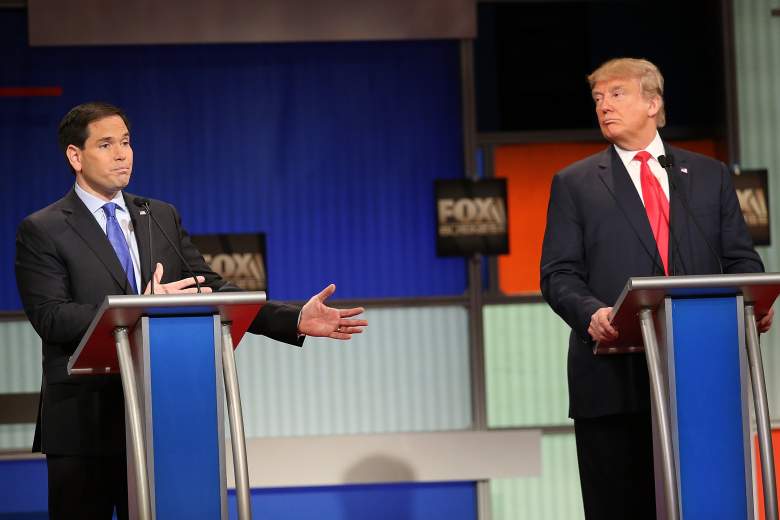
Marco Rubio’s stock in betting markets has dropped as Donald Trump’s has risen. (Getty)
For months, the betting markets were bullish on Rubio despite middling poll numbers. It’s easy to see why: Throughout the race, he’s had sky-high favorability ratings, appeal to disparate elements of the GOP coalition, and a plausible case as the type of “electable conservative” Republicans traditionally seek to nominate.
At some point, though, a candidate with those underlying qualities needs to convert those qualities into votes, and that’s not always easy in a race with a dozen candidates. Being acceptable to an overwhelming majority of voters won’t do you any good if a low percentage of those voters list you as their first choice.
There’s no denying that Rubio’s polling over the past two months has been weaker than what the conventional wisdom would have suggested. As a result, the conventional wisdom has gradually soured on Rubio and moved toward viewing Trump as a plausible GOP nominee, if not the odds-on favorite to win the nomination. On November 18, betting markets monitored by Predictwise gave Rubio a 48 percent chance to win the nomination. Despite leading every national poll by double digits, Predictwise had Trump at just 22 percent. On Sunday morning, Trump was all the way up to 51 percent and Rubio was down to 32 percent — still quadruple the standing of No. 3 candidate Jeb Bush, but nowhere near the “betting favorite” status he enjoyed earlier in the campaign.
Over that time, though, Rubio has had some positive movement in the polls, both nationally and in Iowa, moving past Ben Carson into third place in both categories. His position in Iowa has inched upward, from an average of about 8 percent in early October to an average of about 14 percent in January. He’s at 15 percent in the final Des Moines Register poll of the campaign — the same position eventual winner Rick Santorum had in the final Register poll of 2012.
Though they aren’t as highly regarded as the Register poll, two polls released over the final two days of the campaign paint a better picture for Rubio. An Emerson College poll released Monday showed him at 22 percent, just 4 points behind Cruz and 5 points behind Trump. And an Opinion Savvy poll released Sunday had him at 18.6 percent — just 0.8 percentage points behind Cruz for second place and 1.5 percentage points behind Trump for first. The difference between Trump’s standing and Rubio’s is within the poll’s margin of error, which was 3.2 percentage points. Those weren’t the only polls released over that timespan. A Quinnipiac University poll released Monday isn’t quite as bullish on Rubio’s chances, but it still puts him in a solid third place at 17 percent — 7 points behind Cruz and 14 behind Trump.
Here’s a Rundown of Plausible Scenarios for Rubio
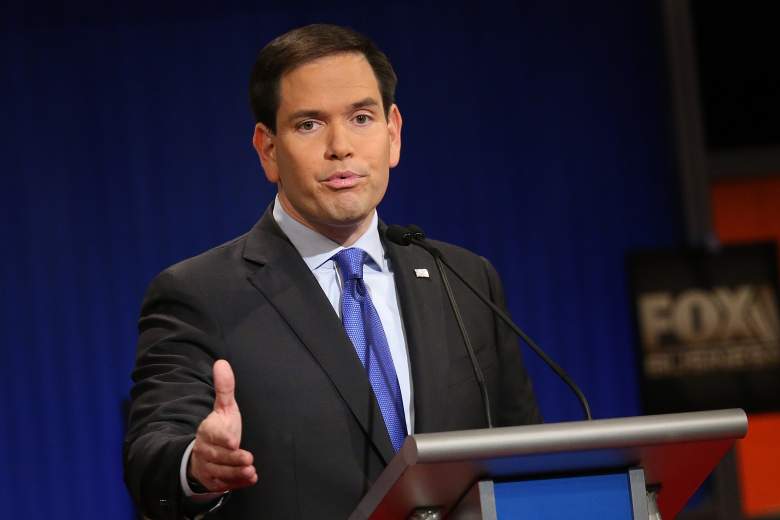
(Getty)
Rubio has a lot to gain and a lot to lose in Iowa. A strong showing could solidify his status as the mainstream candidate around whom the GOP establishment will eventually rally. A weak performance amid rising expectations could make it extremely unlikely that he’ll rebound in New Hampshire, where he’s already struggling to get ahead of John Kasich, Jeb Bush and Chris Christie in the so-called establishment lane.
A “strong finish,” of course, is in the eye of the beholder. One thing that definitely wouldn’t meet the definition is a finish of fourth place or worse. Such an event appears fairly unlikely. Rubio entered Sunday leading Ben Carson by 6 percentage points in RealClear Politics’ Iowa polling averages and leading Carson by 5 points in Saturday’s Des Moines Register poll. But the possibility can’t be dismissed entirely. It’s worth noting, for instance, that the difference between Carson and Rubio in the Register poll is smaller than the difference between Rubio and Ted Cruz, who’s in second place at 23 percent, 8 points ahead of Rubio.
A relatively strong third-place finish — say, at 15 percent, which is where he is in the Register poll — would hardly be cause for celebration, but it would at least allow Rubio to make the case that he’s in better shape than a candidate like Bush, who’s polling in the low single digits in Iowa.
A second place finish, though, would almost certainly be viewed as a win. Finishing behind Trump but ahead of Cruz, for instance, could send Cruz into a death spiral, setting up a two-man race with Trump. Finishing behind Cruz but ahead of Trump would poke serious holes into Trump’s self-portrayal as a “winner,” radically changing the narrative that has unfolded over the past six months.
A first-place finish for Rubio would be a proverbial grand slam, likely allowing the Florida senator to reclaim his status as the GOP’s most likely nominee.
So how likely are each of those scenarios?
Likelihood That Rubio Comes in 2nd, 3rd or 4th
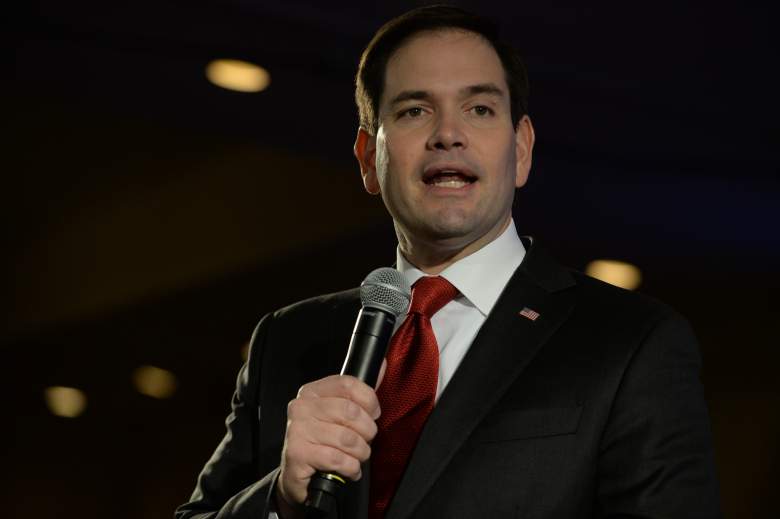
(Getty)
A face-value reading of the polls would suggest that the second scenario — a third-place finish in the mid-teens — is the most likely. The fourth — an outright win — is the least likely, but shouldn’t be dismissed entirely.
The doomsday scenario — a fourth place finish from which Rubio would be unlikely to recover — could come about if Rubio fails to hold onto the share of voters who say they plan to support him, perhaps losing those voters to a candidate like Cruz. That’s unlikely, but not impossible, especially given that a fairly low percentage of Rubio’s supporters say they’re firmly committed to him.
The second outcome — a third place finish — requires little explanation: The polls reflect Rubio’s standing more or less accurately. If they under-represent his support, it’s only by 2 or 3 percentage points — not enough for him to catch Cruz or Trump.
The third outcome — a second-place finish — would require one or more of a handful of factors to break Rubio’s way. A few of those factors: Rubio’s ability to win over a high percentage of undecided voters, who, even a day before the caucus, still make up a sizable portion of the electorate; a strong “get out the vote” effort by Rubio; a continued erosion of support for Cruz, who’s favorability ratings have plummeted over the past month; and a weaker-than-expected performance by Trump, who still has shaky favorability ratings and questions about his ground game.
First, the glass-half-empty take on Rubio’s polling numbers: Though his 15 percent share in the Register poll is identical to that of Santorum’s, a little more scrutiny of the data suggests Santorum was better positioned to gain the 10 points he needed to win the caucus than Rubio is to make a similar surge.
The Register’s Jennifer Jacobs explained:
It might be the case, though, that although there are fewer obvious signs of a Rubio surge, there are enough unusual variables at play here to tilt the race in Rubio’s favor. The biggest unknown may be the performance of Trump, whose unfavorability ratings within his own party are off the charts.
A lot of the other evidence for #Marcomentum is anecdotal. But it may be nevertheless useful. Here’s a sample of it from GOP message guru Ellen Carmichael.
Likelihood That Rubio Wins
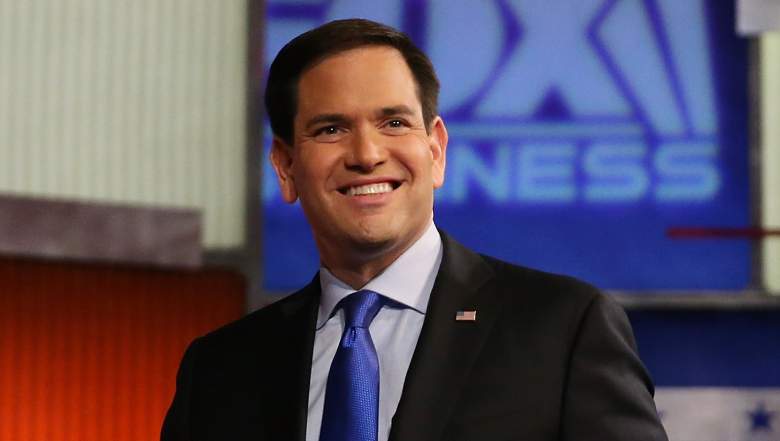
(Getty)
The scenario in which Rubio not only exceeds expectations, but wins Iowa outright, is essentially the second place scenario on steroids. It requires all of the following to happen:
— Rubio holds onto his current supporters and wins over an even-better-than-expected share of undecided voters
— Trump’s support, at least in Iowa, turns out to be a mirage
— A sizable share of conservative voters — perhaps enough to account for 5 percentage points — move from Cruz to Rubio
If the “grand slam” scenario unfolds, it will mean the Register poll, long considered the “gold standard,” underestimated Rubio’s support by a sizable margin, likely in the neighborhood of 10 percentage points. That isn’t exactly likely, but it’s not impossible. The Register’s track record is excellent, but not perfect.
Then there’s the Opinion Savvy poll, and this from Time’s Zeke Miller:
The large fields and last-minute nature in which many voters make up their minds make predicting primary elections an inexact science at best. Even the best polls are often off substantially on certain candidate’s vote totals, and a lot can and usually does change in the final days — if not the final hours — of a campaign.
Fivetirtyeight’s polls-only forecast, which takes only state polls into account, gave Rubio a 7 percent chance to win Iowa on Sunday. The site’s polls-plus forecast, which also factors in endorsements and national polls, had him at 10 percent. On Monday, his chances jumped to 11 percent in the polls-only model and 14 percent in the polls-plus model.
He’s a longshot, but he has a chance.